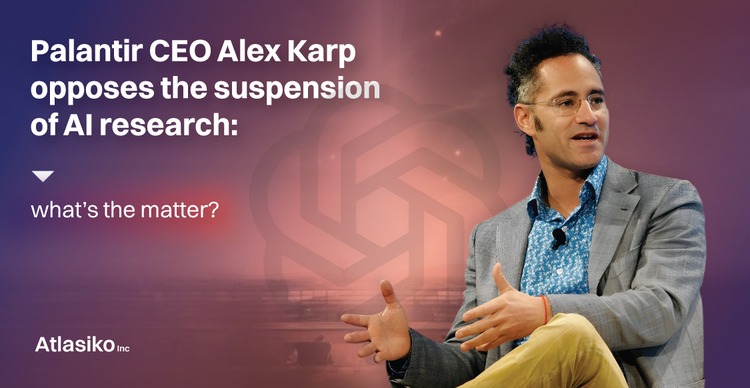Today, AI is rapidly gaining popularity among tech manufacturers. And, of course, there is no shortage of controversy amid the struggle for industry leadership. One of these stumbling blocks was an open letter, published on March 22, 2023, calling for a halt on AI research for models larger than GPT-4, the technology behind tools such as ChatGPT. The letter, initiated by the Future of Life Institute, has amassed more than 31,000 signatures, including prominent names like Elon Musk, CEO of Tesla, and Steve Wozniak, co-founder of Apple. Additionally, the signatories propose that if a swift pause is not possible, governments should intervene and implement a moratorium. In contrast to the open letter signed by influential figures in the tech industry, Alex Karp, the CEO of Palantir, a public American company that specializes in big data analytics, expresses his opposition to the idea of pausing artificial intelligence (AI) research.
During an interview with BBC Radio, broadcasted on Thursday, Karp voiced his disagreement, suggesting that many of those calling for a pause lack tangible AI products. Without explicitly naming individuals, he claimed that those urging a pause have nothing to offer and merely wish to study AI. However, he cautions against such a pause, as it could potentially allow adversaries to gain an advantage not only in commercial applications but also in military domains.
Karp asserts that "studying this and allowing other people to win both in commercial areas and on the battlefield" would be a highly disadvantageous strategy. When asked if he desires an AI race similar to the Cold War arms race, Karp simply stated that an AI arms race is already underway, with Palantir currently leading the charge. He emphasizes that slowing down Palantir's AI efforts would not halt the AI race but instead allow other countries to catch up.
Talking about the significance of AI utilization in military contexts, Karp underscores that the primary focus should not solely be on large language models like GPT-4. Instead, he highlights how AI has been effectively employed in military applications. Specifically, he references Ukrainian forces using Palantir technologies to gain a technological advantage over Russian invaders. A report from The Times in December 2022 revealed that Palantir's AI capabilities enabled Ukraine to enhance the precision, speed, and lethality of its artillery strikes, despite possessing relatively more minor artillery forces. Palantir provides software to governments and private sector organizations, assisting them in analyzing extensive datasets.
According to Karp, the deployment of AI-powered software on the battlefield presents a challenge to every country worldwide, particularly to adversaries who cannot afford to allow Palantir to maintain this advantage. He asserts that the race is already underway, with the question being whether Palantir will continue to lead or concede the lead to others.







